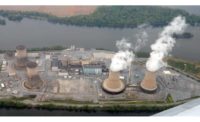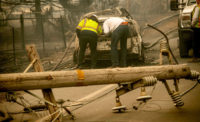BP Unit Arco Agrees to Spend $150 Million on Montana Smelter Cleanup

Energy company Atlantic Richfield Co., now a division of oil giant BP, must pay $150 million to clean up contamination from its long-closed Anaconda mine and copper smelter near Butte, Mont., under a settlement filed in federal court on June 8.
The Butte-Silver Bow Council of Commissioners approved the settlement in late May. Negotiated over 14 years with state and municipal officials and the U.S. Environmental Protection Agency, it now is subject to 30 days of comment and approval by the court.
Cleanup includes removal of contaminated tailings and sediments from Silver Bow and Blacktail creeks and the adjacent floodplain. It also requires additional treatment of contaminated stormwater and contaminated groundwater.
The area includes 26 miles of stream and stream-side habitat downstream from Butte. Mining wastes have been dumped into areas in and around Butte, since the late 1800s, as well as into streams and wetlands near mining operations, smelters and mills. These activities contaminated soil, groundwater and surface water with heavy metals, EPA said.
The agreement provides the framework for the continued cleanup of mining-related contamination. “While we still have work to do I am confident that we will meet our deadline of 2027 for completing all of this work and beginning the process of delisting Butte from the Superfund National Priorities List in 2024,” Doug Benevento, EPA associate deputy administrator, said in a statement. The site has been listed since 1983.
The 150-page agreement gives details on waste remediation, cleanup of waterways and land use. Ten areas will be transformed into 120 acres of greenspace. Engineering for the first project is complete, with the schedule of remaining cleanup areas yet to be developed, Jon Sesso, a state senator and local Superfund coordinator, told local media.
Atlantic Richfield will provide financial assurances for future cleanup actions, EPA said. BP bought the firm in a $27-billion deal in 1999.
The company has spent about $500 million since 1980 cleaning up hazardous waste created by the Anaconda copper smelter following an EPA plan. In February, it entered into a settlement with homeowners to pay nearly $30 million for removal of lead and arsenic-contaminated soil and attic dust in nearby homes and yards.
Meanwhile, an April ruling by the U.S. Supreme Court could make such settlements more difficult to reach and less conclusive, attorneys from Holland and Knight said in a review of the decision.
The court ruled in a lawsuit Atlantic Richfield filed against property owners in the Butte cleanup case that state courts may hear individual claims seeking cleanup beyond what EPA required under federal law. But the justices also said that the agency must approve that additional remediation.




